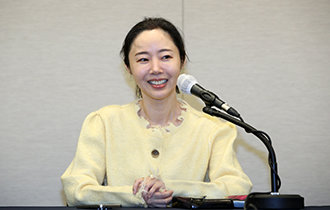[Editorial] Do You Want a War?
It seems that people of the Roh Moo-hyun administration do not fear North Koreas possession of nuclear weapons. The president himself called the Norths nuclear test a small problem. Chairman Kim Geun-tae of the Uri Party stated that despite the UN sanctions against North Korea, the inter-Korean economic cooperation should go on; he even said he would visit the Gaesong Industrial Complex as if he was trying to demonstrate his commitment to what he claimed.
Radioactivity was detected near the East Sea, and the UN Security Council unanimously adopted a resolution on sanctions against the North yesterday, but the people in power are still focusing on maintaining relations with Pyongyang. Their reasoning goes: We should prevent a war by all means, and if we pressure the North, a war might happen. When asked for a more resolute position on North Korea, they asked back: Then do you want us to have a war?
That is what we have been told so repeatedly for eight and a half years under the Kim Dae-jung and Roh Moo-hyun administrations.
Even if one indicates the limitations of and problems with their giving everything to the North or simply emphasizes the necessity of Korea-U.S. coordination, what he always gets is a threat to the people: What are you going to do if a war takes place? In his recent book, Reunification comes like a landslide, Park Gwan-yong, former speaker of the National Assembly, called mentioning a war, gangster-style language of talking back, saying, How does dealing with the Norths war preparations and correcting its human rights abuses translate to going to war?
Such tactics of the Roh administration were clearly proved during the last presidential election, when they capitalized on the propaganda of dubbing themselves peace forces and the counterpart war forces. This is in line with the logic of the North Korean regime that defines the international communitys pressures and sanctions for dissuading it from having nuclear weapons as a declaration of war. Nowadays, the North Korean regime cries out to the world it would not refrain from having a war, and the South Korean government asks the people, Do you want us to go to war? The ruling power of Korea gets along so well with the Kim Jong Il regime that we cannot but wonder what their relations with the Kim regime are.
What really drives us to the brink of war is those who blind-sightedly push for an engagement policy toward North Korea. In the name of political independence designed to overcome the limitations of being non-mainstream in the domestic politics, they helped and supported the North, but what they got in exchange was nothing but a nuclear test. That is the consequence of an engagement policy that was only about making compromises without principles, pride or strategic considerations for national interests. Historically, no engagement policy has succeeded. The example of World War II, which Britain and others had to suffer after making compromise without knowing the ambitions of Hitlers, should be lesson for us.
If we stick to an engagement policyeven when it could not prevent the North from possessing nuclear weaponswe are doomed to be enslaved by North Korean nuclear weapons in the next phase of developments. We were already nervous even when North Korea did not have nuclear weapons; now that it does possess nuclear weapons, how nervous will we get? Every time North Korean leader Kim Jong Il refers to the word nuclear, our society will be paralyzed and the 48 million people sleep badly at night worrying about it. Even then, will they still embrace and speak for the Northwith the all same logic of Do you want us go to war?
It is nonsense that an administration with finite terms drives Koreas future to such a catastrophe. If realization of liberal democracy and market economy, which is a universal value of humanity and the spirit of the Korean Constitution, equals our national interests, the Roh administration should definitely change course. If it does not intend to deteriorate the whole country with a sloppy pro-North Korean leftist ideology and devote it to the Kim Jong Il regime, it ought to reconsider its wrong engagement policy. It should stop deceiving the people with artful words and insinuating countenance.
By actively cooperating for the UN Security councils resolution on sanctioning North Korea, it should escape the trap of wrong sunshine policy/engagement policy. It cannot dissuade the North from having nuclear weapons if it publicly releases a Foreign Ministry statement endorsing the UN Security Council resolution and secretly tries to escape from sanctions anyway. It should quickly push for not a blind-sighted engagement policy but a North Korea policy based on reciprocity that can actually change the Norths behavior and its system. Complying with the UN Security Council resolution and strengthening Korea-U.S. coordination for this purpose should be the very first step to take.







